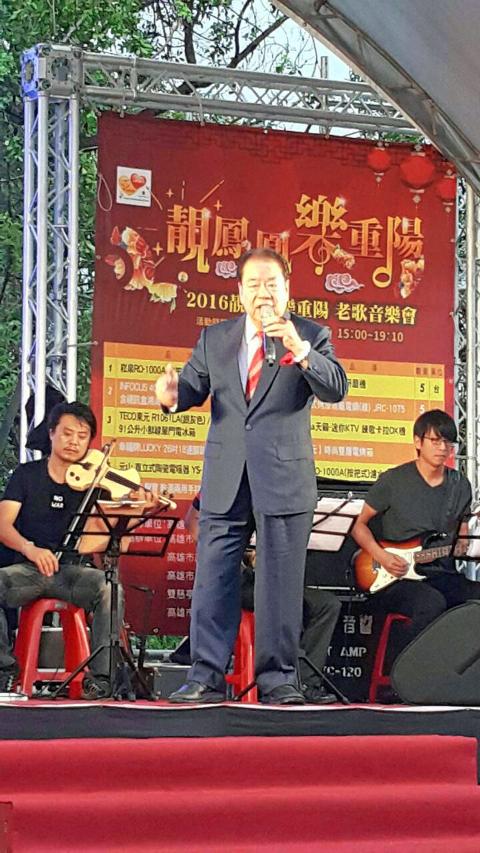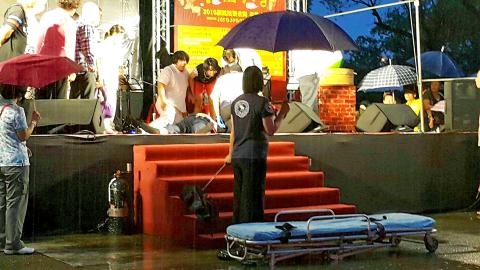Kuo Chin-fa (郭金發), a famous singer who has been a household name since the 1960s, yesterday collapsed during a performance in Kaohsiung and was later pronounced dead at a hospital.
Made famous by his signature song Hot Rice Dumpling (燒肉粽), Kuo, who sang in Hoklo (also known as Taiwanese), was performing at an event in Weiwuying Township (衛武營) in the city’s Fengshan District (鳳山) to mark the Double Ninth Festival, the traditional senior citizens’ day which falls on the ninth day of the ninth lunar month.
According to audience members, Kuo performed his first two songs without incident, but as he started singing his third song, Hot Rice Dumpling, the audience noticed something was wrong.

Photo: Copy by Tsai Ching-hua, Taipei Times
“At first we thought that the microphone had gone dead as there was no sound, but then Kuo fell over on the stage,” an audience member said, adding that that emergency first aid attempts failed to revive the singer and the district office called an ambulance. Kuo was taken to the Kaohsiung Armed Forces General Hospital.
While the event continued and the audience wished the best for Kuo, the hospital pronounced him dead at 7:19pm.
Born in 1944, Kuo discovered his love of singing when he entered a competition as a 15-year-old. He was introduced to the music industry at 17 by Yeh Chun-lin (葉俊麟), a renowned Taiwanese songwriter.

Photo: Copy by Tsai Ching-hua, Taipei Times
Although he released hundreds of albums, Kuo remains most well-known for Hot Rice Dumpling, as well as his rich baritone voice.
Later in life, Kuo started a rice dumpling business in Kaohsiung, but the restaurant has since closed.
Kuo had expectations for his son, Kuo Chien-meng (郭建盟), to become a politician. Kuo Chien-meng was elected a Kaohsiung city councilor twice as a member of the Taiwan Solidarity Union before becoming a part of Kaohsiung Mayor Chen Chu’s (陳菊) team.
In 2010, Kuo Chien-meng was nominated for city councilor by the Democratic Progressive Party and was voted into office. He won a subsequent term in 2014.

US President Donald Trump yesterday announced sweeping "reciprocal tariffs" on US trading partners, including a 32 percent tax on goods from Taiwan that is set to take effect on Wednesday. At a Rose Garden event, Trump declared a 10 percent baseline tax on imports from all countries, with the White House saying it would take effect on Saturday. Countries with larger trade surpluses with the US would face higher duties beginning on Wednesday, including Taiwan (32 percent), China (34 percent), Japan (24 percent), South Korea (25 percent), Vietnam (46 percent) and Thailand (36 percent). Canada and Mexico, the two largest US trading

ACTION PLAN: Taiwan would expand procurement from the US and encourage more companies to invest in the US to deepen bilateral cooperation, Lai said The government would not impose reciprocal tariffs in retaliation against US levies, President William Lai (賴清德) said yesterday, as he announced five strategies to address the issue, including pledging to increase Taiwanese companies’ investments in the US. Lai has in the past few days met with administrative and national security officials, as well as representatives from various industries, to explore countermeasures after US President Donald Trump on Wednesday last week announced a 32 percent duty on Taiwanese imports. In a video released yesterday evening, Lai said that Taiwan would not retaliate against the US with higher tariffs and Taiwanese companies’ commitments to

‘SPECIAL CHANNEL’: Taipei’s most important tasks are to stabilize industries affected by Trump’s trade tariffs and keep negotiations with Washington open, a source said National Security Council Secretary-General Joseph Wu (吳釗燮) arrived in the US for talks with US President Donald Trump’s administration, a source familiar with the matter said on Friday. Wu was leading a delegation for a meeting known as the “special channel,” the Financial Times reported earlier. It marked Trump’s first use of the channel since returning to the White House on Jan. 20. Citing a source familiar with the matter, the Financial Times reported that Minister of Foreign Affairs Lin Chia-lung (林佳龍) was also a part of the delegation. The visit came days after China concluded war games around Taiwan and amid Trump’s

CHIP EXCEPTION: An official said that an exception for Taiwanese semiconductors would have a limited effect, as most are packaged in third nations before being sold The Executive Yuan yesterday decried US President Donald Trump’s 32 percent tariff on Taiwanese goods announced hours earlier as “unfair,” saying it would lodge a representation with Washington. The Cabinet in a statement described the pledged US tariffs, expected to take effect on Wednesday next week, as “deeply unreasonable” and “highly regrettable.” Cabinet spokeswoman Michelle Lee (李慧芝) said that the government would “lodge a solemn representation” with the US Trade Representative and continue negotiating with Washington to “ensure the interests of our nation and industries.” Trump at a news conference in Washington on Wednesday announced a 10 percent baseline tariff on most goods